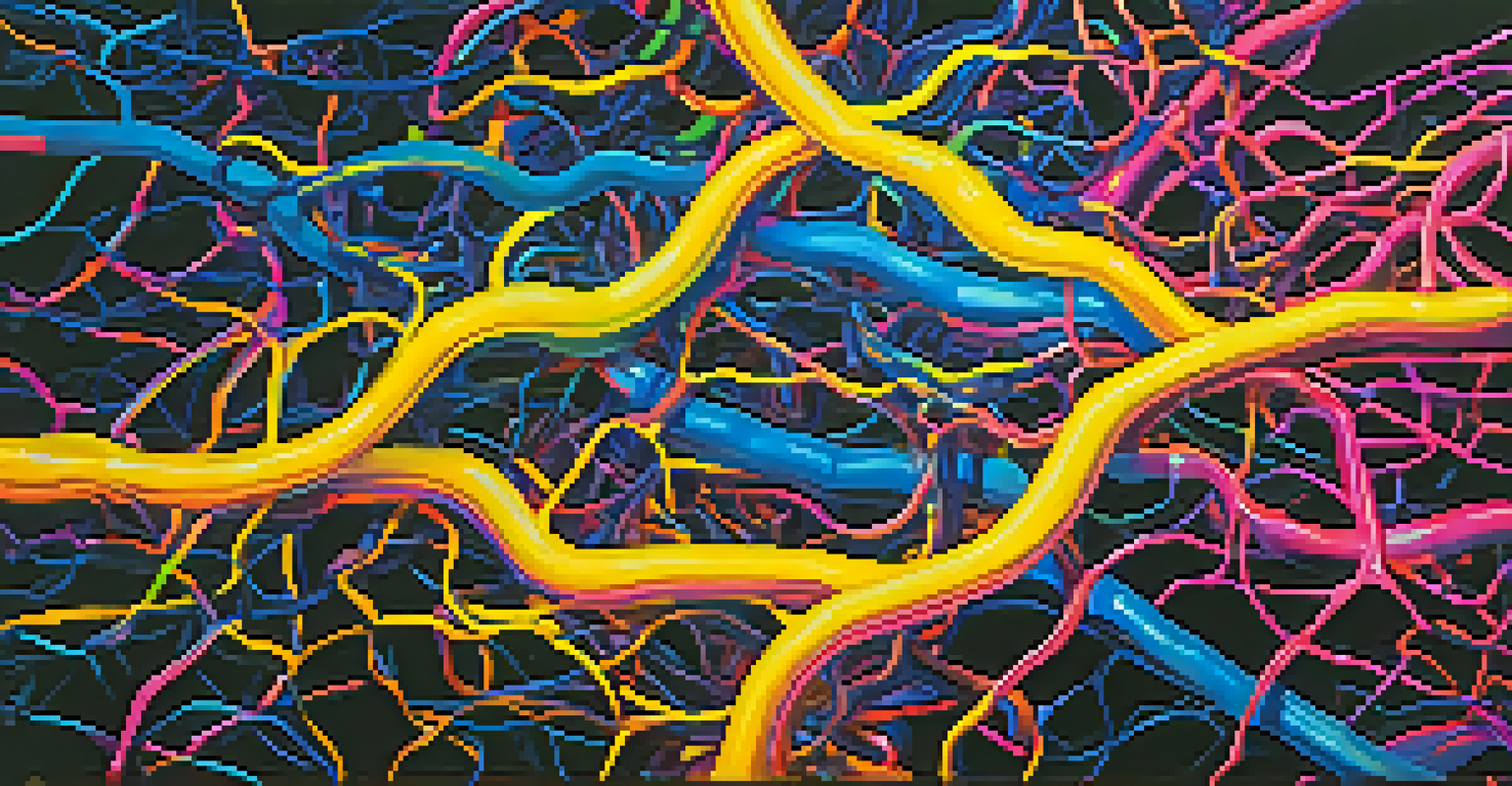Hallucinogens: Effects on Memory and Cognitive Function

Understanding Hallucinogens: An Overview
Hallucinogens are substances that alter perception, mood, and various cognitive processes. Common examples include LSD, psilocybin (magic mushrooms), and DMT. These compounds can lead to profound changes in sensory experiences, often referred to as 'trips'. Understanding how these substances work is critical as they have been both revered and feared throughout history.
The mind is everything. What you think you become.
While many view hallucinogens as recreational drugs, they have been used in various cultural rituals and are gaining attention in modern therapeutic settings. Researchers are exploring their potential benefits for mental health, including depression and PTSD. This duality highlights the complexity of hallucinogens and how they can influence the mind in both beneficial and detrimental ways.
As we delve deeper into the effects of hallucinogens, it's essential to consider their impact on cognitive functions, especially memory. Memory is not just about recalling facts; it's about how we perceive and interact with the world. The intricate relationship between hallucinogens and memory is a fascinating area of study with implications for both neuroscience and psychology.
How Hallucinogens Affect Cognitive Function
Cognitive function encompasses a range of mental processes, including attention, reasoning, and problem-solving. Hallucinogens can significantly alter these processes, often leading to enhanced creativity and novel thinking during the experience. Many users report feeling a sense of interconnectedness and heightened awareness, which can foster unique insights.

However, the effects are not universally positive. Research indicates that while some cognitive functions may improve temporarily, others, particularly short-term memory, can suffer. Users may struggle to recall information or maintain focus, which can lead to confusion or impaired decision-making during a trip.
Hallucinogens Alter Perception
These substances can profoundly change sensory experiences and cognitive processes, leading to both enhanced creativity and impaired memory.
In essence, hallucinogens can create a double-edged sword for cognitive function. While they may open new avenues of thought, they can simultaneously disrupt the mental clarity necessary for everyday tasks. Understanding this balance is crucial for anyone considering the use of these substances.
The Impact on Memory: Short-term vs Long-term
Memory can be divided into short-term (working memory) and long-term (storage of information). Hallucinogens often impact short-term memory more significantly, making it challenging for users to retain new information during their experience. This can lead to moments of forgetfulness or difficulty in following conversations.
Reality is merely an illusion, albeit a very persistent one.
On the other hand, long-term memory effects are less clear. Some studies suggest that hallucinogens might enhance the recall of certain memories, particularly those tied to strong emotions. This phenomenon can lead to therapeutic applications, where revisiting past experiences under the influence of these substances can facilitate healing.
Ultimately, the effects of hallucinogens on memory are complex and can vary widely from person to person. Factors such as dosage, environment, and individual psychological makeup can all influence outcomes, making it essential to approach this topic with nuance.
Therapeutic Potential of Hallucinogens
Recently, there has been a resurgence of interest in the therapeutic potential of hallucinogens. Clinical trials are exploring their ability to treat conditions like anxiety, depression, and PTSD. By altering cognitive processes and emotional states, these substances may help individuals confront and process traumatic memories more effectively.
One notable example is the use of psilocybin in controlled settings, where patients report profound changes in their outlook on life. Such experiences often lead to significant breakthroughs in therapy, showcasing the potential of these substances when used responsibly. This highlights an important shift in how we view hallucinogens, from mere recreational drugs to tools for mental health.
Therapeutic Uses Are Emerging
Recent research is exploring hallucinogens' potential to treat mental health conditions like anxiety and PTSD, showcasing their possible therapeutic benefits.
However, it’s crucial to approach this therapeutic potential with caution. While the results are promising, further research is needed to understand the long-term effects and ensure safety. The path towards integrating hallucinogens into mainstream therapy requires careful consideration and robust scientific validation.
Risks and Dangers of Hallucinogen Use
Despite the potential benefits, hallucinogens are not without risks. Users can experience adverse effects such as anxiety, paranoia, and even psychosis, particularly in those with underlying mental health issues. The unpredictable nature of these substances can lead to dangerous situations, especially if used in unregulated environments.
Moreover, the context in which hallucinogens are consumed plays a critical role in the experience. A negative setting, or 'bad trip', can lead to lasting psychological distress. It is essential for users to be aware of their surroundings and mental state before engaging with these substances.
Ultimately, while hallucinogens can offer unique experiences and potential therapeutic benefits, it is vital to weigh these against the risks. Education and awareness are key to ensuring that individuals make informed decisions about their use.
The Science Behind Hallucinogens and Memory
The effects of hallucinogens on memory and cognition can be attributed to their interaction with neurotransmitters in the brain, particularly serotonin. By binding to serotonin receptors, these substances can alter mood and perception, leading to the vivid experiences associated with hallucinogens. This neurochemical change is a fundamental aspect of how these drugs affect cognitive functions.
Research has shown that hallucinogens can induce changes in brain connectivity, leading to enhanced communication between different regions of the brain. This increased connectivity may explain the heightened creativity and altered perception of time reported by users. However, it also raises questions about the stability of cognitive processes during such experiences.
Risks Must Be Considered
Despite their potential advantages, hallucinogens carry risks such as anxiety and psychosis, emphasizing the need for informed and cautious use.
Understanding the science behind these effects can help demystify the experiences associated with hallucinogens. As research continues to evolve, we may uncover more about how these substances reshape our cognitive landscape and memory processes.
Future Directions in Hallucinogen Research
As the stigma surrounding hallucinogens begins to fade, research into their effects on memory and cognition is gaining momentum. Scientists are increasingly interested in understanding the nuances of these substances and their potential applications in mental health. Future studies may focus on optimizing therapeutic protocols to maximize benefits while minimizing risks.
Moreover, as technology advances, researchers can employ more sophisticated methods to study brain activity during hallucinogen experiences. Brain imaging techniques may reveal more about how these substances alter cognitive processes and memory formation, leading to deeper insights into their effects.

In conclusion, the future of hallucinogen research holds promise for both science and mental health. By continuing to explore their impact on memory and cognition, we can better understand these fascinating substances and their potential to improve lives.